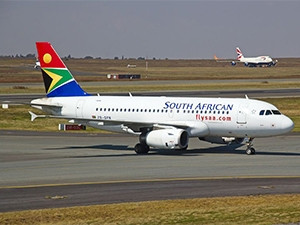
Passengers at OR Tambo International Airport in Johannesburg are experiencing delays after the introduction of a biometric system at immigration checkpoints.
OR Tambo is Africa's biggest and busiest airport, facilitating approximately 19 million passengers a year.
The biometric system was introduced on Friday by the Department of Home Affairs (DHA) in a bid to bolster SA's national security. From December last year, only transit travellers went through the biometrics process.
Various airports around the world use biometrics to verify fliers' identities by scanning their faces, irises or fingerprints. At London Gatwick Airport, for instance, a trial took place in 2013 in which the airport processed 3 000 British Airways passengers without boarding passes.
Foreigners entering US airports and seaports have their fingerprints scanned and photographs taken, in a tough new drive to tighten border security.
DHA spokesperson Mayihlome Tshwete says the biometric system was initially only implemented for transit travellers at OR Tambo, but was rolled out across all immigration stations at the airport on Friday.
The department says it has identified the capturing of biometrics as a key element in securing movements of persons in and out of SA. According to the DHA, the purpose of taking biometric data at ports of entry is to accurately identify people and determine whether they pose a risk to the country.
By using biometrics, SA immigration is helping to prevent the use of fraudulent documents, protect visitors from identify theft, and stop criminals and immigration violators from entering the country.
In terms of process, the biometrics (photo and fingerprints) of a traveller are captured in addition to the normal scanning of the passport to record the movement on DHA's enhanced movement control system. For the first registration, the department captures all 10 fingers. Subsequent movements will require capturing of only one finger for verification purposes.
'Horrific experience'
However, since the introduction of the system, travellers have been delayed.
In a Facebook post last week, the airport noted: "Passengers are advised that the Department of Home Affairs has changed over to the biometric system. This may cause delays on international inbound and outbound passenger processing at the immigration checkpoints. Passengers should be mindful of their connecting flight and adjust accordingly."
Some passengers have been venting their frustration over the delays on social media. One traveller posted on Facebook: "I sat for four hours in the queue on Friday night. Arrived early and checked in for a boarding at 19.30 and only got through at 20.30.
"No communication, no control. Utter chaos. People panicking and needing medical support, elderly woman who lost her husband in the queues. Arguments which got physical. Children got caught up in it all. People missed their flights and your staff were filming us and taking photos and laughing on the other side. Very disappointed. The foreigners got a horrific experience of South Africa. There were many ways to take control and get communications going to the passengers."
Another passenger wrote: "So you knew there would be disruption and still didn't bring in any more immigration officers?"
According to Tshwete, the operational difficulties were because of delays from both the passengers learning to use the system, and from the DHA facilitating the change.
Meanwhile, the Airlines Association of Southern Africa concurs, saying the delays were caused by the introduction of the biometric system at all immigration counters.
The association notes it will work with other stakeholders, such as the DHA and Airports Company SA, to address the problem.
Share